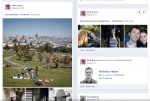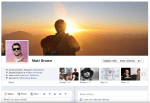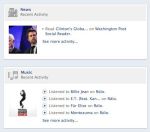During the F8 conference on Thursday, Facebook’s CEO Mark Zuckerberg took the stage to introduce a host of new features that are rolling out to the social network. The major change is called “Timeline” and it takes advantage of existing pictures and status updates to create a more visual experience of “who you are.” As you scroll down your personal timeline, you’ll be able to view pictures and updates throughout the years. There is a new option in the upper right-hand side of your profile to quickly skip to a year in time too, and many of the features are also available on Facebook’s mobile applications. Read on for more, including a video of Facebook’s Spotify integration in action.
“This isn’t all of the stuff that I did in 2007,” Zuckerberg explained while showing off his own profile. “It’s just the most important stuff.” Timeline automatically hides information that Facebook doesn’t think is important, but if it is, you can easily switch it to show that content. In addition, users can click the Timeline and add photos to earlier points in time before Facebook existed, such as their childhoods. Apps can also populate the timeline.
Facebook also added a new “Reports” feature in Timeline. Reports can be compiled every month or every year, and they provide a summary of your Timeline including everything you’ve ever done with a Facebook application. Apps can be added directly from a friend’s Timeline, too. Timeline provides an ability to “highlight and curate all of your stories so you express who you really are,” Zuckerberg said. That means you can customize your homepage with a large photo, dubbed the “Cover,” in addition to your profile picture. Lastly, you can restrict access to certain parts of your Timeline if you choose.
Facebook is also adding “verbs” to status updates which will allow people to “express themselves in new ways.” For example, a user can say they
read a book or
reviewed a restaurant. These will be added to a “lightweight stream” on the side of Facebook’s homepage as an activity and not in the news feed.
Facebook revamped its OpenGraph protocol so developers can include this functionality in their apps. “OpenGraph will enable apps that focus on two things,” Zuckerberg said, noting that the first is the Timeline and the second is discovering new things through your Facebook friends, such as music.
A “real-time serendipity” feature allows you to share content such as Spotify songs with friends easily. If someone is listening to a song on Spotify, you can hover over it and listen along with them or chat with your friend about it. “Developers are using OpenGraph to not only rethink music, but to rethink the whole music industry,” Zuckerberg said. Facebook partnered with other music companies for content as well, although it highlighted its relationship with Spotify. “You’ll now start seeing new music posts and play buttons all over your newsfeeds,” Spotify said in a blog post on Thursday. “Hit a play button and the music starts. Right there.”
Finally, Netflix CEO Reed Hastings also took the stage to discuss and upcoming social version of Netflix that will allow you to discuss what you’re watching with friends, though no additional details were given during the keynote.
Facebook has just used their keynote at f8 to unveil a major new feature:
Timeline. It’s your Profile re-imagined in a more visual way. “It’s the heart of your Facebook experience, completely re-thought from the ground up,” CEO Mark Zuckerberg noted.
The focus is on three key things:
- all your stories
- all your apps
- a new way to express who you are
So what does it look like? Check it out below.
Update:
And here’s a bit of backstory.



























